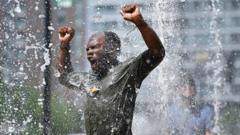As temperatures climb across eastern North America, a severe heatwave has led to alarming hospitalizations and emergency responses, impacting both the U.S. and Canada. This week, over 150 attendees of a graduation ceremony in Paterson, New Jersey, suffered from heat-related illnesses, prompting the city's mayor to declare a state of emergency and cancel recreational activities. Meanwhile, in Washington, D.C., six concert-goers were hospitalized during a performance by the popular K-pop group 'Stray Kids'.
Local officials are grappling with the consequences of this unprecedented heat event, which has triggered alerts for over 160 million people across several regions, including parts of Ontario, Quebec, and Nova Scotia. In North Carolina, dozens sought medical attention due to the oppressive heat, including at least 41 individuals hospitalized in the central part of the state. The rapid increase in hospitalizations from heat-related ailments led New Jersey authorities to label the situation a "mass casualty" incident, forcing some graduation events to be canceled entirely.
Experts have cautioned that the combination of high temperatures and high humidity levels poses an increased risk for heat-related illnesses, especially during a prolonged period of extreme weather, with overnight lows in some cities failing to drop below 80°F (27°C). As summer officially began just a week ago, the heatwave could result in record-breaking temperatures—potentially reaching 101°F (38°C) in New York, which would match the city's highest recorded temperature for June, set in 1966.
The National Weather Service (NWS) has issued urgent guidelines advising the public to recognize signs of heat exhaustion and stroke. Citizens are being encouraged to stay hydrated, avoid sun exposure during peak hours, and check on vulnerable neighbors, especially the elderly and those with pre-existing health conditions. Energy companies across the eastern U.S. have also called for power conservation to prevent blackouts as residents lean heavily on air conditioning to manage the unbearable heat.
Local officials are grappling with the consequences of this unprecedented heat event, which has triggered alerts for over 160 million people across several regions, including parts of Ontario, Quebec, and Nova Scotia. In North Carolina, dozens sought medical attention due to the oppressive heat, including at least 41 individuals hospitalized in the central part of the state. The rapid increase in hospitalizations from heat-related ailments led New Jersey authorities to label the situation a "mass casualty" incident, forcing some graduation events to be canceled entirely.
Experts have cautioned that the combination of high temperatures and high humidity levels poses an increased risk for heat-related illnesses, especially during a prolonged period of extreme weather, with overnight lows in some cities failing to drop below 80°F (27°C). As summer officially began just a week ago, the heatwave could result in record-breaking temperatures—potentially reaching 101°F (38°C) in New York, which would match the city's highest recorded temperature for June, set in 1966.
The National Weather Service (NWS) has issued urgent guidelines advising the public to recognize signs of heat exhaustion and stroke. Citizens are being encouraged to stay hydrated, avoid sun exposure during peak hours, and check on vulnerable neighbors, especially the elderly and those with pre-existing health conditions. Energy companies across the eastern U.S. have also called for power conservation to prevent blackouts as residents lean heavily on air conditioning to manage the unbearable heat.




















